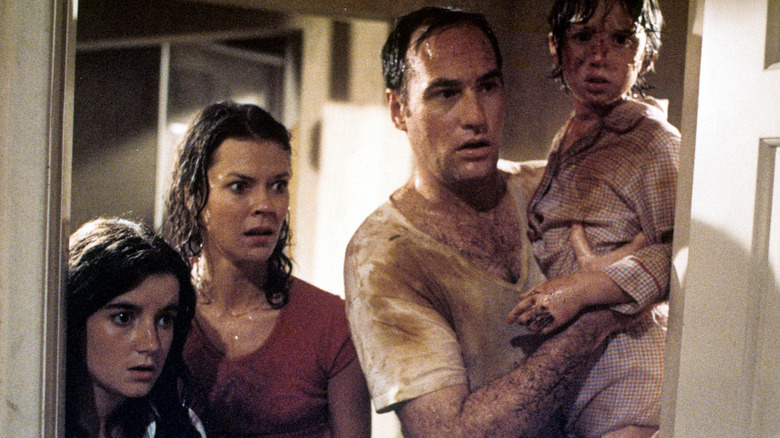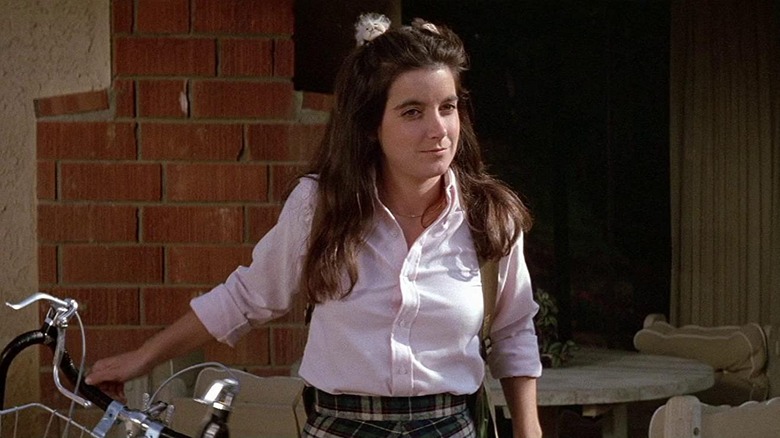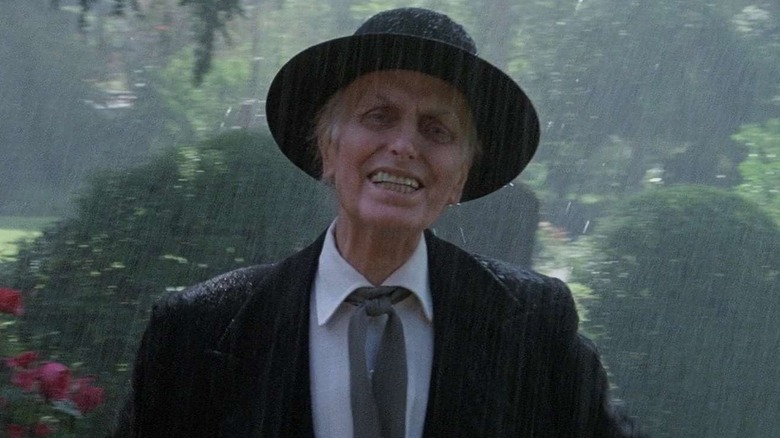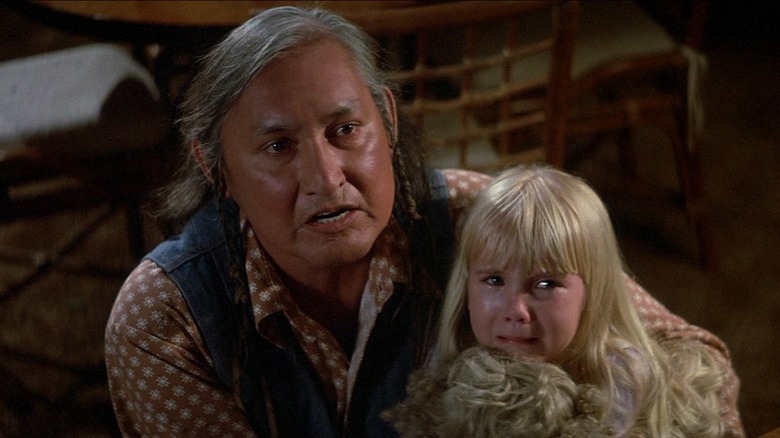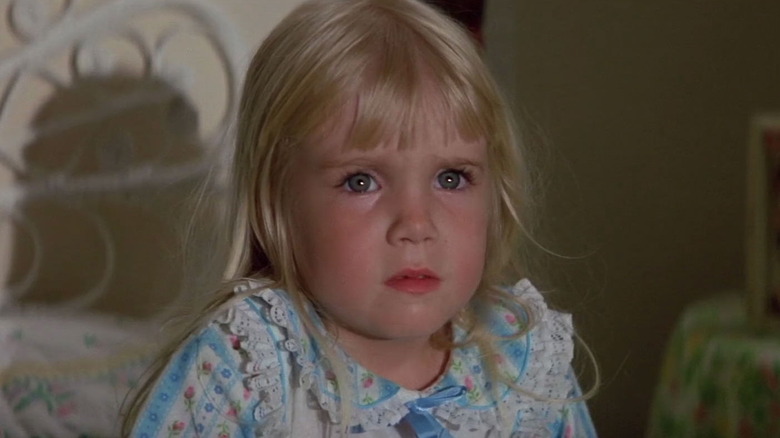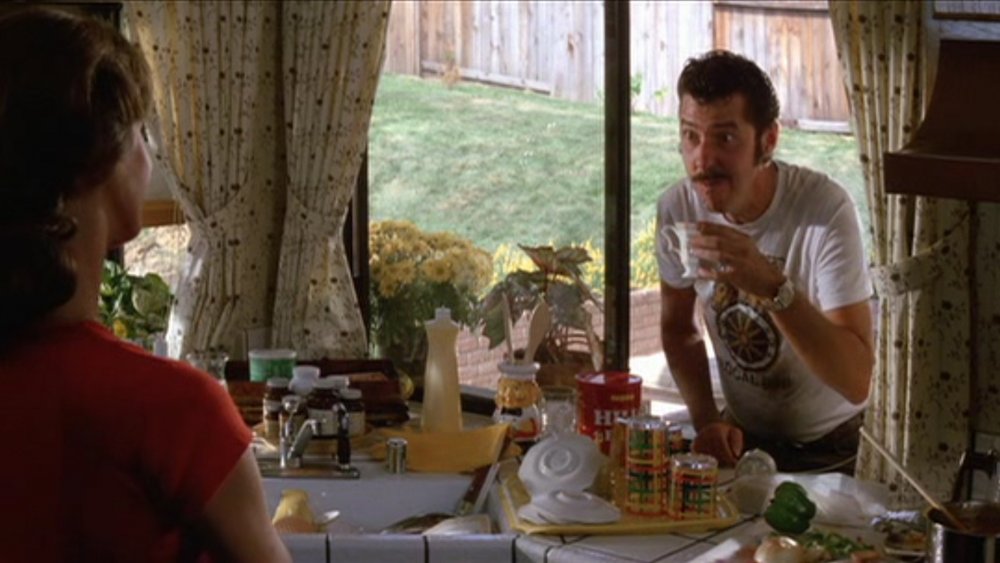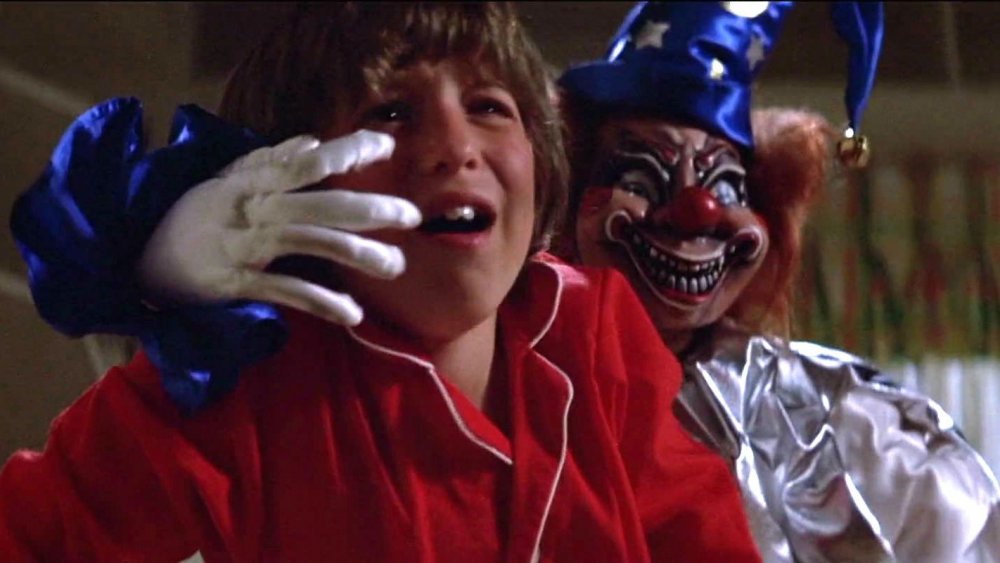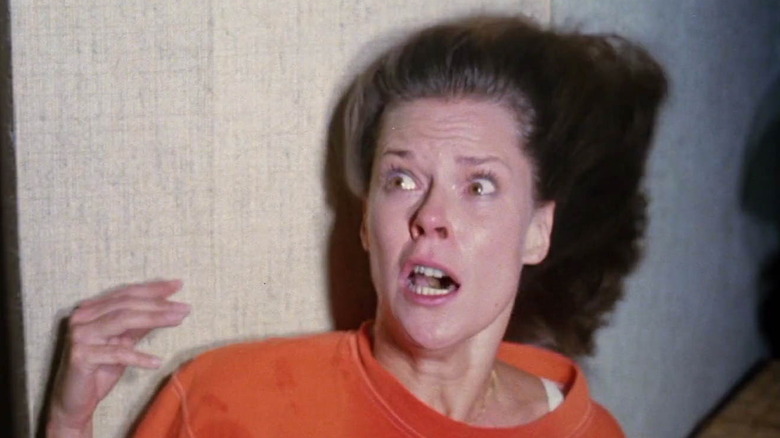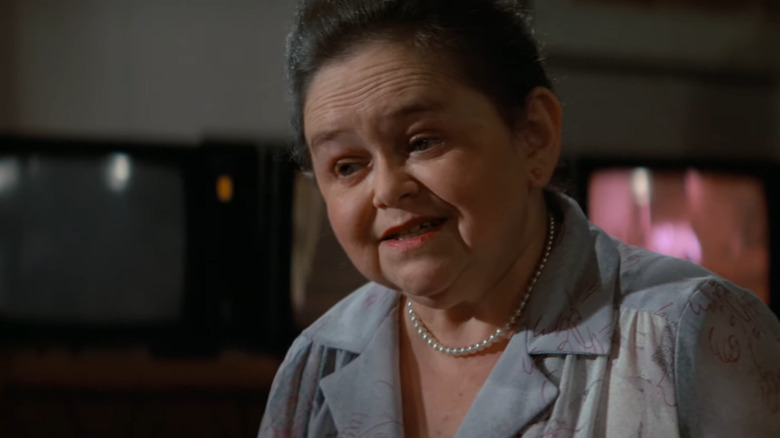The Tragic Real-Life Story Of The Poltergeist Cast
"They're heeeeere!" Who can forget those chilling words from little Carol Ann (Heather O'Rourke) as ghostly apparitions projected out of a television and into the Freeling family household in the classic 1982 horror film "Poltergeist?" The "TV People" — later revealed to be led by the evil Reverend Kane (Julian Beck) — would go on to terrorize audiences (as well as the Freelings) in two additional movies, 1986's "Poltergeist II: The Other Side" and the final film in the trilogy, 1988's "Poltergeist III." (We're not counting the ill-received remake.)
All three movies are filled with memorable, spine-tingly moments such as the hideous clown doll that pulls Robbie Freeling (Oliver Robins) under his bed or perhaps the nightmarish tree that smashes through his bedroom window and literally tries to devour him. Another etched-in-brain scene for many is from the second film, when Steve (Craig T. Nelson) swallows a possessed worm while guzzling a bottle of tequila, which leads to him eventually vomiting out an H.R. Giger monstrosity. What happens in these movies is truly the stuff of nightmares, but to many, it's what happened in real life to some of the "Poltergeist" cast members that's far more tragic.
Even if you're just a casual moviegoer or horror fan, you've probably heard of "the 'Poltergeist' curse," as it's been the subject of many online articles, TV specials and mini-documentaries. Sadly, four lead actors from the trilogy all suffered deaths within a six-year span following the original film's release, leading many to believe that the movie sets were somehow cursed. This led to other various myths and exaggerated claims about what happened on the set, so let's take a look at the disturbing real-life story of the "Poltergeist" cast.
Dominique Dunne was murdered by her ex-boyfriend
Perhaps one of the most grisly and tragic "Poltergeist" deaths was that of 22-year-old actress Dominique Dunne, who played the eldest sister in the first film, Dana Freeling. Her character was mentioned in "Poltergeist II" as being off to college, but the reality was, any ideas screenwriters might have had for her character in the sequel had to be scrapped entirely due to Dunne's untimely death just months after the original movie was released.
On the evening of October 30, 1982, Dunne was brutally strangled by an aggravated ex-boyfriend. The assailant, identified as sous chef John Sweeney, showed up at her West Hollywood home in hopes of repairing their relationship and moving back in with her. An argument erupted on Dunne's driveway, where the deadly attack took place. When police arrived at the scene, Sweeney was quoted as saying, "I've killed my girlfriend!"
At the time, Dunne was still alive; she was rushed to Cedar's-Sinai Medical Center, where she remained in a coma for five days and never regained consciousness. On November 4, 1982, just three weeks before what would have been her 23rd birthday, she was removed from life support and pronounced dead. Dunne was considered a rising star at the time and had just landed the role of Robin Maxwell in the 1983 science-fiction miniseries "V," which she was rehearsing for the night she was assaulted.
Julian Beck was incredibly ill during the second Poltergeist movie
Arguably one of the creepiest villains in horror history, Reverend Henry Kane is the human form of "The Beast," played by thespian Julian Beck. He's the gaunt, 19th century-looking cult leader who spends most of "Poltergeist II" trying to infiltrate the Freeling residence and abduct Carol Ann — and yes, he's also the same dude who possessed the aforementioned tequila worm. Even though he completed principal photography of the film, Beck would never live to see the theatrical release of "Poltergeist II" since he passed away on September 14, 1985 — during the film's post-production period and a full eight months before its premiere.
Unlike Dominique Dunne's shocking murder, Beck passed away after a long battle with stomach cancer, something he had been diagnosed with in 1983. So while his death is certainly unfortunate, it also definitely wasn't out of left field. Beck was dying of stomach cancer during the production, and the entire crew was well aware of his diagnosis. Some believe it even influenced his chilling final performance in a film.
Will Sampson passed away after Poltergeist II
Some remember actor Will Sampson as Chief Bromden, the deaf-mute patient at a mental institution who befriends Jack Nicholson's lead character in "One Flew Over the Cuckoo's Nest." However, horror fans know him as Taylor, the Native American shaman from "Poltergeist II." Sadly, Sampson passed away due to post-operative kidney failure following a heart and lung transplant. Again, this is another death of a cast member that eerily occurred not long after the release of a "Poltergeist" movie. Sampson died on June 3, 1987, but much like Beck's situation, he had a preexisting medical condition. Sampson suffered from scleroderma, a chronic degenerative condition that caused him severe malnourishment and other complications with his heart, skin, and lungs. He was only age 53 at his time of death, and his passing was a devastating loss, but he'll always be remembered by fans of horror cinema.
Heather O'Rourke died at a shockingly young age
The most well-known death that fuels the "Poltergeist" curse fire to this day was the shocking loss of Heather O' Rourke, who played Carol Ann — the young, angelic face of the franchise. During production of "Poltergeist III" in 1987, O'Rourke was undergoing treatment for Crohn's disease, which would turn out to be a misdiagnosis. In the third episode of Shudder's "Cursed Films" docuseries, director Gary Sherman shares several memories and speaks very fondly of the young actress, saying that, aside from O'Rourke's "chipmunk cheeks" — a side effect caused by the bowel inflammation medications she was taking at the time — she remained in high spirits and overall seemed physically fine and enjoyed her time on the set. Little did anyone else know that something fatal was brewing within.
Fast forward to January 1988, when O'Rourke became severely ill, and her health started deteriorating at an alarming rate. On February 1, 1988, she was rushed to the hospital, where she ultimately died due to septic shock caused by undetected intestinal blockage. This blockage ruptured, and the toxins released in her body proved to be too much. During an operation, the 12-year-old O'Rourke was undergoing the same day of her death, it was also revealed that she did not have Crohn's disease but an acute bowel obstruction due to a congenital stenosis — something that could've been surgically corrected had it been detected sooner.
With only four months until the film's release, her death caused the studio to force Sherman to shoot an entirely new ending using a double, something the director was strongly against. He preferred that the movie not be released at all, but MGM ultimately had its way. O'Rourke's tragic end would be the fourth death of a "Poltergeist" major cast member in a six-year span.
Lou Perryman was killed years after Poltergeist
While the deaths of Dominique Dunne, Julian Beck, Will Sampson, and Heather O'Rourke are seen as part of the supposed "curse," there is another death that some fans like to bring up to further pile on the evidence, but it happened 17 years after the release of the original movie, and it's very likely someone you don't recall seeing.
Actor Lou Perryman, who had a very minor role as a construction worker named Pugsley, was gruesomely murdered in his home by Seth Christopher Tatum — an ex-con with a history of mental health problems. On April 1, 2009, Tatum was on the run after a violent altercation with his mother's ex-boyfriend when he randomly came across Perryman's home (the two had never met) and killed him. His reason? Just to steal his car. The case was settled two years later when the killer, who'd stopped taking his medication for bipolar disorder shortly before the murder, was sentenced to life in prison.
Oliver Robins is alive and well
It's apparent there's a lot of real-life death surrounding the "Poltergeist" movies, and while some like to believe it has to do with a curse, others believe it's simply a string of unfortunate coincidences. Plus, you might also hear other false or exaggerated "Poltergeist" myths, such as all three kids from the original film died, which is totally untrue. Robbie Freeling, played by Oliver Robins, is alive and well.
In a 2015 interview with the Daily Mail, when asked about the strange deaths surrounding the franchise, he told them he believes there is no curse. "To be completely honest, I don't think anyone that was involved in the movie ever really took the curse seriously. There is no curse — it is just tragic coincidences," he said. "People may try and connect the dots and make something out of it, but they are possibly going to make connections that probably aren't there. They do make for great spooky stories, but at the end of the day, they really aren't true."
Did real human skeletons cause the Poltergeist curse?
If there is a "Poltergeist" curse, what caused it? One widely-discussed theory is the fact that real skeletons were used by the effects crew in the first two movies, most notably in the muddy swimming pool scene from the original with Diane Freeling, played by JoBeth Williams. Desecration of human remains plays a big role in the first film as the probable cause of the Freelings' pesky poltergeist problem. How ironic would it be if these real skeletons somehow jinxed the cast? This theory doesn't exactly hold up, though — Williams is still alive and well, as is Daddy Freeling himself, Craig T. Nelson.
One man who's strongly against the notion that these real skeletons led to the deaths of the actors is special make-up effects artist Craig Reardon, who worked on "Poltergeist." Speaking on Shudder's "Cursed Films," Reardon said, "Apparently, there's a contingent of people out there who believe that the fact that real human skeletons were used are some kind of pretext to 'explain' why two actresses that worked in the film subsequently died, which is not only just conceptually ridiculous, but is personally offensive to me."
As Reardon went on to point out, "Human skeletons have been used in movies for years and years." Examples cited in his interview include "House on Haunted Hill" and the 1931 "Frankenstein." "No low-budget B film is gonna pay anybody to sculpt a human skeleton when all you had to do was go to a biological supply house and get a human skeleton. You know, wake up and small the budget. That's really the way it worked," he added. "The idea of having a few of them on the set of 'Poltergeist' and killing two lovely young girls is a pretty pernicious idea."
Zelda Rubinstein slams the Poltergeist curse
Perhaps one of the most famous "Poltergeist" characters of all, arguably only second to Carol Ann, is the clairvoyant ghost-vanquisher Tangina "This House Is Clean" Barrons, played to perfection by Zelda Rubinstein, who passed away at the age of 76 in 2010 due to complications that followed a mild heart attack. Most never consider her death part of the curse due to her age, cause of death, and how far removed it was from the close string of deaths between 1982 and 1988. And that's likely how she would want it. Much like Oliver Robins, Rubinstein always felt the idea of a "Poltergeist" curse was just superstitious nonsense. In fact, you might even say she found it to be downright preposterous.
In a 1988 interview during a Showbiz Today segment on CNN, she candidly spoke about the curse in her signature gracious manner but ended it on a classy yet blunt note. "I owe it to Heather to present her case, as most honestly and lovingly as I can. I loved this child very much and I am still very grieved at her passing," said Rubinstein. "Heather died because of an undetected, congenital, anatomical defect. Julian Beck died from cancer in his mature years. Will Sampson passed away after receiving a heart and lung transplant. It's my understanding he had an environmental disease. And Dominique Dunne died at the hands of an extremely ill-directed, passionate boyfriend. These are reasons, I do not call this a jinx. I think that it's pretty much a courtesy to put to an end this superstitious crap."
